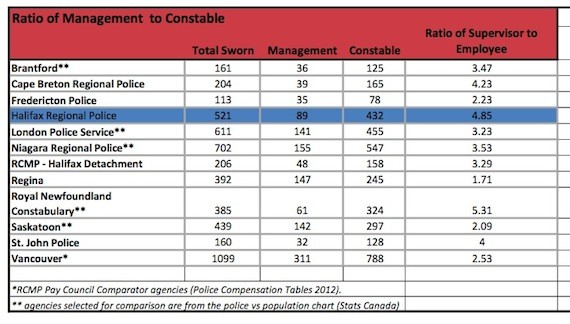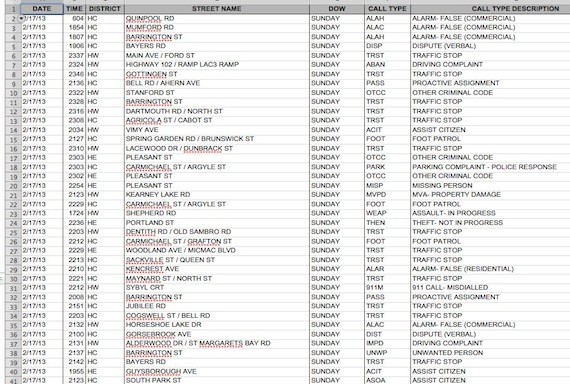This is a longer version of an article that appears in today's dead tree version of The Coast.
First, however, I must apologize to deputy police chief Bill Moore, for misquoting him, here, when I wrote that he said that "most people aren't interested in" the location of sexual assaults. As I usually do at events, I both recorded the presentation and took notes. Typically, when I'm going to quote someone saying something potentially controversial, I go back and check the recording against my notes. I didn't do that this time, and now I can't find the recording. Moore says he didn't say that, and I believe him, so I unequivocally apologize.
Not in my defence, but more as an explanation, let me tell you my thoughts when I wrote that. I didn't find what I wrote particularly controversial. I now see that it can be taken that way, but what Moore was trying to convey, and what I was trying to write, was that the particular location of domestic sexual assault is not of the same sort of concern in a crime mapping exercise as is a random street sexual assault. That's not to say domestic assaults aren't important—clearly, they are—but rather that when people go to a crime map, they're looking for something different. That doesn't change the perception of this; in may haste, I wrote something in my notes that wasn't an accurate quote, and readers took it from there. I screwed up.
I'm particularly upset by my mistake because the gist of the article is that the police department has been doing a better job, and a visibly better job, at getting information out. They're responding positively to my long criticism of the secrecy that has surrounded the department, and the last thing I want to do is stupidly or needlessly poison the relationship we've been forging. In a bit, I'll explore the department's latest attempt to increase public information.
The improvements coming from department brass, and the police PR machinery, however, are in contrast with the old attitudes still exhibited by the Board of Police Commissioners.
Commission meetings are public, but only nominally. In order to attend, you have to present yourself at the front desk in the police department, and somehow get the attention of clerks who are typically dealing with long lines of citizens doing whatever it is they do at the police department. The citizens get mad if you attempt to flag down a clerk instead of standing in a half-hour line, and the clerks, while well-intentioned, don't often realize there's even a Commission meeting, much less that anyone in the public would actually go. But once you're able to navigate that, they have to find someone to escort you up to the board room where the meeting takes place. It's all very strange, and off-putting. I'm not sure why they can't meet two blocks down the hill at City Hall, but there it is.
Tuesday, the Commission met to approve a proposed budget presented by police chief Jean-Michel Blais. The meeting was held in public but none of the documents discussed by the commission, including the budget itself and supporting documents, were made available to the public before hand. And during the meeting itself, commissioners were handed numerous documents, none that were shared with the three reporters in the room. At several points in the discussion commission chair Earl Gosse gave explicit instructions to commissioners to not make documents public, even though by law any document presented in a public meeting is by definition public.
The lack of public information led to a bizarre meeting, where commissioners were discussing numbers not available to reporters, and reporters were trying to reconstruct a budget using snippets of information uttered by commissioners. Only after the meeting was over, when a reporter complained loudly, did the documents become public. Commissioner Linda Mosher gave The Coast a packet of information she had, but all the documents didn’t become public until the next day, when they were emailed to The Coast.
Regardless, here’s what we can report: Blais’ total proposed budget is for $73,718,700 a 5.4 percent increase over last year’s budget of $69,913,700. That increase far exceeds city council’s goal of keeping budget below the inflation rate of 2.1 percent.
More than 90 percent of the increase is related to salaries, which were locked in by a contract signed over a decade ago. The contract is up for renewal in 2015. Blais went to pains to explain that he is limited by the terms of the contract, but that he is converting five positions that are currently staffed by police officers into less costly civilian positions.
Those five positions include two anti-graffiti positions, which caused Mosher to go on an extended rant about how graffiti is a “gateway crime” that leads to drug use, vandalism and even murder, so deserves the attention of actual police officers.
Besides salaries, one of the biggest increases in the police budget comes from what is called “source witness protection,” which are costs incurred through protecting someone who is willing to testify in court. Sometimes these people are merely protected up to the time of the trial, but other times they could be relocated out of Halifax, with the cost of the move paid for through the police budget. Last year about 10 people were so protected at a cost of $226,000. That's now $476,000.
The proposed budget must still be approved by city council, but that’s a foregone conclusion. Commissioner Barry Dalrymple said he would go to bat for the budget, even if that meant cutting other city department budgets. Council will discuss the budget in April.
Here are the documents we received:
Proposed police budgetI'm very interested in readers' take on this information. The thing that jumps out at me is the last file, the ratio of management to constables. Of the comparison police departments, Halifax ranks second-most brass-heavy.
Cost Centre Detail
Costs per sworn police officer
RCMP Contract
Employment history and proposed
Efficiencies—job elimination and reclassification
Ratio of management to constables
I suspect that's because the department is still recovering from all the new management positions that were created in expectation of taking over RCMP duties in all of HRM. After a lot of outcry in suburban areas, which like their RCMP policing, that proposed take-over was aborted, but we're left with the larger management staff. Reducing that ratio would, of course, reduce costs.
Wednesday evening, police spokesperson Theresa Rath sent me a document detailing police calls over a seven-day period, and suggested this sort of list might soon become a regular public document.
The list logs each and every police call. Here's a screen cap of part of the first page, to give an idea of it:
This is good. It's evident that the department is making an effort to increase public information, and this is much more than we've been getting. It's even a big improvement over the crime mapping feature, which itself was a huge improvement.
I realize the department is facing some technical challenges in terms of getting information out. I don't quite understand why this is such a limitation, but I accept it for the time being. But here's what more I'd like to see: First, this information should be matched to the crime map, so you can click on the map and find these additional details. (The lack of specific times on the crime map is problematic, for example.) Second, I'd like to see the responding officer(s)'s names identified. Third, Rath points out that the list doesn't detail the disposition of the call—whether someone was arrested or charged, and that info should be brought in. Lastly, the gold standard: the officers written report, or the "blotter" entry, which explains what happened in prose.
There's still another set of relevant information, and that's how these calls are recorded for crime statistic an court purposes. But that's a very long conversation for another day. For now, I'm happy to report that the department is responding positively.

















